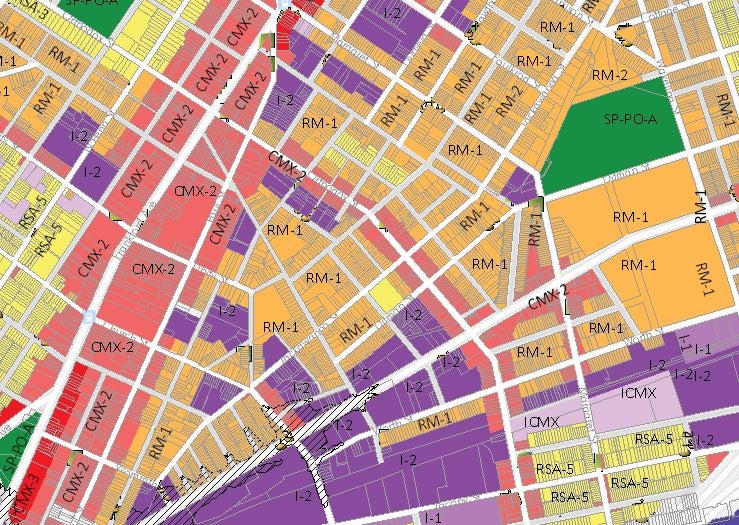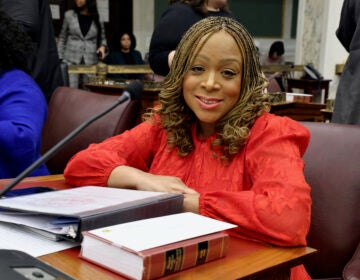Rules Committee recommends code clean-up bill without amendments to RCOs, CMX-2 district

The bill drafted by the City Planning Commission and intended to make small technical changes to the new zoning code got a favorable recommendation from City Council’s Committee on Rules Wednesday morning. The bill, which was first introduced last spring but held back over concerns about whether its changes were truly “technical,” will get a first reading at the next meeting of City Council, Thursday morning.
A 57-page piece of legislation, Bill No. 120774 corrects typographical errors in the new code, clarifies some of its definitions, brings illustrations into line with text and makes other small changes to various provisions, such as requiring developers to notify district councilmembers as well as Registered Community Organizations when going before the zoning board.
In a previous Committee hearing, Councilwoman Jannie Blackwell had proposed a handful of amendments to the new code’s provision on Registered Community Organizations. The Planning Commission felt that those changes were more substantive than technical, however, and on Wednesday Blackwell agreed to withhold the amendments from the clean-up bill.
Blackwell does intend, however, to introduce RCO amendments in a separate bill, most likely on Thursday morning, November 15th. And the amendments are expanded from those she introduced a few weeks ago. In addition to removing the requirement that all RCOs with interest in a specific project convene a single meeting, the amendments now include a provision allowing the district councilmember to appoint a representative to the Civic Design Review Committee.
A draft of the proposed amendments is attached to this article. A special hearing on the RCO provision is scheduled for the Rules Committee Friday morning. If Councilwoman Blackwell introduces her separate bill Thursday morning, it will get a Committee hearing on December 4th, according to Eva Gladstein, deputy director of the Planning Commission. Blackwell could not be immediately reached for comment.
Councilman Brian O’Neill, who was also unavailable for comment Wednesday afternoon, had introduced three amendments to the code clean-up bill. Two of them were introduced formally before the last Committee hearing two weeks ago. They included a change to the code’s definition of “minor amendments” to master plans, defining such an amendment as one as small as 2,500 square feet of additional construction, and a handful of changes to the use tables for light- and medium-industrial districts. The Planning Commission said it had “reservations” about those changes, but did not formally oppose them; they were added to the clean-up bill Wednesday morning.
O’Neill’s third amendment, which he circulated just moments before the last Committee hearing was recessed, would have changed the classification of 21 uses in the CMX-2 district. The changes would have made it more difficult to build things like ice cream shops and artist studios in certain commercial corridors; CMX-2 accounts for around a third of commercially zoned land in Philadelphia, according to the Planning Commission.
The Commission took a strong stand against the proposed changes to the commercial use tables.
“The uses in commercial districts have been thoroughly reviewed over the four-year Zoning Code Commission process, including dozens of public meetings, as well as several Council hearings,” said Commission Chair and Deputy Mayor Alan Greenberger Wednesday morning. “These changes were not raised in Council’s recommendations to the ZCC, nor at several Council briefings held this fall. We oppose making such dramatic changes to the City’s major commercial mixed-use district without the benefit of additional experience with the new zoning code and a more thorough review.”
O’Neill may elect, like Blackwell, to introduce the changes as a separate bill. But even without the official advertising of a bill containing those changes, representatives of a few commercial corridors—in Kensington and Chinatown, and on Lancaster Avenue—showed up to protest the amendments.
The tradition of Councilmanic Privilege makes it easy—historically, at least—for district Council members to do whatever they want to the zoning code. But protestors to these amendments—of whom there are many—can, at the very least, force them to sit through a long, and combative hearing.
Contact the reporter at jaredbrey@gmail.com and follow him on Twitter @jaredbrey
WHYY is your source for fact-based, in-depth journalism and information. As a nonprofit organization, we rely on financial support from readers like you. Please give today.






